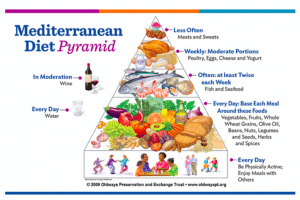
Mediterranean Diet – What, why and how
Research has shown that changing from the Western Diet to a Mediterranean Diet (MD) can help to reduce the risk of developing heart disease, cancer and other diseases.
What does a MD consist of?
- Rich in fruit, vegetables, legumes and cereals (especially wholegrains)
- Sustainably sourced fish and white meat – lean red meat eaten infrequently
- Monounsaturated oils are used in place of saturated fats
- Moderate red wine intake with meals (but kept within Government recommended guidelines of no more than 14 units per week)
How could I benefit from changing to a MD?
- Research suggests decreased risk of cancer, heart disease and chronic conditions such as hypertension, high cholesterol and type 2 diabetes
- Positive impact made on Parkinson’s disease and Alzheimer’s disease has also been noted
- Reduction in weight has also been observed
How do I make MD changes to my everyday lifestyle?
- Increase intake of vegetables, legumes, fruit and wholegrain cereals
- Decrease red meat intake and replace with fish and lean white meat alternatives
- Change to mono-unsaturated based oils such as extra virgin olive oil or rapeseed oil
- Cut out processed ‘fast foods’ and ‘ready meals’
- Consume only moderate amounts of dairy foods, low-fat is preferable
- Try to avoid sprinkling salt on your food as it is already present in many food items
- Snack on fruit, dried fruit and plain nuts instead of crisps, chocolate and biscuits
- If you do drink, change to red wine, but have no more than 14 units throughout the week, spread over at least 3 days
- Aim to only drink water as it is the best non-alcoholic drink
- Tea and coffee is acceptable in moderation but sugary soft drinks should be avoided
These changes can be made as slowly or as quickly as you would like. But having them in mind will give you an end point goal.
Mediterranean Diet Food Pyramid
Have the pyramid gives you a solid base for an understanding into what should be consumed on a daily or weekly basis when it comes to proportions. Having this in mind will help you to envisage your weeks worth of meals and what you need to prepare for when food shopping.

Non-dietary factors to consider
The lifestyle of the Mediterranean diet also plays an important part of healthy living and aims to include factors such as physical activity, eating socially and controlling portion sizes.
Aim to include at least 30 minutes of moderate activity 5 days a week, if you have not carried out much exercise recently increase gradually.
The Mediterranean diet can be high in fat (unsaturated fat) mainly sourced from virgin olive oil, it is important that if you need to control your weight then you may need to choose fewer servings from some or of each food group, exercise will also help with weight control.


